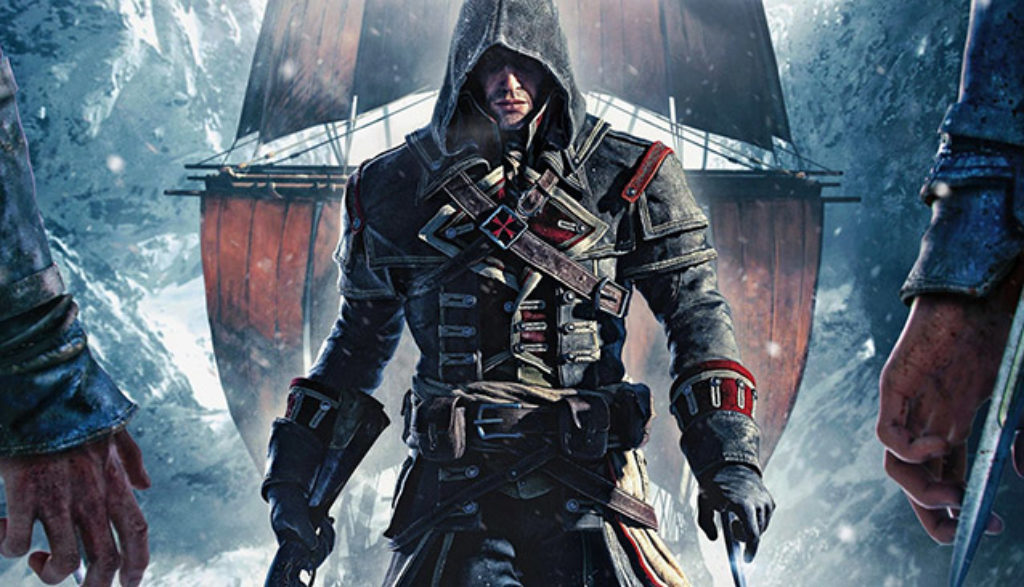
Think of Assassin’s Creed: Rogue as a bonus assassination quest that sets out on its own little mission of mayhem at the same time as Assassin’s Creed: Unity. Rogue serves as something of a bridge to Unity, while offering gamers a closing chapter to the Black Flag saga and one last shot across the bow of the Xbox 360 and PlayStation 3.
Reliving history through highly advanced whiz-bang technology has always been at the core of the Assassin’s Creed storyline. This game sorta puts a twist on that twist. In the metastory “present,” gamers play as a hapless employee of the Abstergo Entertainment company. He’s a nameless fellow who’s charged with plugging into the past life of an Irish-twanged ancestor by the name of Shay Cormack. Shay is an apprentice assassin in the time of George Washington and Ben Franklin who must play his part in the ever-present tug-and-pull struggle between the hide-in-plain-sight warring factions of Templars and Assassins.
The twist comes in when Shay earnestly looks at the deadly choices the Assassins are making and decides that all of the secretive brotherhood’s actions—stretching back to the days of Ezio Auditore da Firenze (in Assassin’s Creed II)—have been misguided and wrong. And so it’s up to Shay to set things aright, essentially switching to the Templar cause and hunting down all his former compatriots before they destroy the world with their sought-out magical “Pieces of Eden.”
Well!
That little loyalty flip certainly makes this game unique when it comes to Assassin’s Creed history and lore. It challenges gamers to rethink automatic expectations of loyalty and asks them to not only weigh the benefits of liberty vs. order, but also question what’s gone on through the last seven years of Assassin’s games. What really makes up a hero or a villain? Who has the true corner on saving the world? Are there hidden motivations on both sides of the conflict that have altered the groups’ trajectories?
Those thought-provoking elements give this entry an unexpected freshness.
They don’t, however, make it any cleaner or easier to deal with. Uses of f- and s-words still pepper the dialogue from time to time. And the game’s near-patented twisted biblical history and alien-like spirituality is all just as confusing and humanity-threatening as ever.
Once Shay sets out to do what’s right, well, it’s back to bloody business as usual. Yes, he can choose to leap through the trees and sneak through bushes a bit more, while killing nearby innocents a bit less. And since this title follows on the heels of Black Flag, there’s quite a bit of sailing through the iceberg-laden waters of the Atlantic—providing shipwreck-exploring and open-ocean cannon-blazing battle action that gets us away from the typical knife-to-the-throat Assassin’s fare. But eventually and inevitably Shay’s hard-learned sneak-hunt-and-murder skills must take center stage.
A few new weapons, such as a silenced rifle and a deadly gas gun join the life-ending mix. As do gut-dividing wrist blades and body-hacking swords, with grim and gory aftereffects mingling with the muffled screams of the dying. It’s all just as gleefully played out as in any other Assassin’s encore. And setting aside the challenging questions the game raises, is it somehow worse that the furious sword fights and pistol blasts to the heart come at the expense of “friends and relatives” you spent the first third of the game getting to know?

After spending more than two decades touring, directing, writing and producing for Christian theater and radio (most recently for Adventures in Odyssey, which he still contributes to), Bob joined the Plugged In staff to help us focus more heavily on video games. He is also one of our primary movie reviewers.